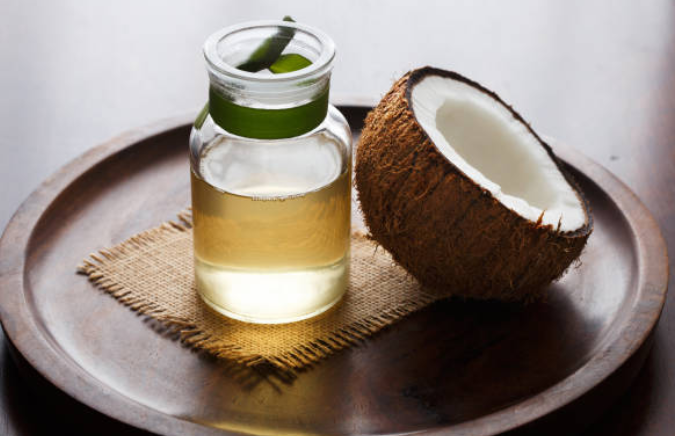Coconut Oil for Hair Growth, Shine, Moisturize, Dry, Damaged, Frizzy, Dandruff Hair

Coconut oil is a boon in the world of cosmetics and food. And its benefits are myriad that it is well worth incorporating it into our beauty routine. In addition, it is an economical and versatile product, which can be very useful day to day. The oil has a dry, non-greasy feel when applied to the skin and hair, making it suitable for use as a moisturizer or hair conditioner.
Hair Moisturizer
To begin with, coconut oil is an excellent conditioner and moisturizer for our hair. If you apply it on your hair everyday on the ends of your hair you will notice the difference, as it helps prevent dryness and split and damaged ends. You can put a little coconut oil in your mask or conditioner to enhance its effects. It is a natural moisturizer that can help to nourish and hydrate dry, damaged hair. It can also help to reduce protein loss from the hair, which can lead to dry, brittle strands.
To use coconut oil as a hair moisturizer, you can apply a small amount to your hair, concentrating on the ends, and then brush or comb through to distribute it evenly. You can leave the oil in your hair for a few hours or overnight, and then wash it out with a mild shampoo. You can also add a few drops of coconut oil to your regular conditioner for an extra boost of moisture. It’s important to use a small amount of coconut oil, as too much can weigh down the hair and make it greasy.
Dandruff
If you suffer from dandruff or dry scalp, coconut oil is a very effective home remedy. Massage your scalp twice a week with a little coconut oil, leave it on for 10 minutes, then remove with plenty of water and wash your hair. This natural product will penetrate the scalp improving its condition and making your hair much healthier.
Coconut oil is often used as a natural remedy for dandruff because it has antimicrobial and anti-inflammatory properties. When applied to the scalp, coconut oil can help to:
- Moisturize the scalp: Dandruff can be caused by a dry, flaky scalp, and coconut oil can help to moisturize and hydrate the scalp, reducing flakiness.
- Kill dandruff-causing fungi: Coconut oil contains lauric acid, a type of medium-chain fatty acid that has antimicrobial properties. This means that it can help to kill the fungi that can cause dandruff, such as Malassezia.
- Reduce inflammation: Coconut oil has anti-inflammatory properties that can help to reduce inflammation on the scalp, which can contribute to dandruff.
To use coconut oil for dandruff, you can massage a small amount of melted coconut oil into your scalp and leave it on for a few hours or overnight before washing it out with a mild shampoo. You can also add a few drops of coconut oil to your regular shampoo or conditioner for an extra boost of moisture and to help combat dandruff. It’s important to use a small amount of coconut oil, as too much can weigh down the hair and make it greasy. It’s worth noting that dandruff can have a variety of causes, and coconut oil may not be effective in all cases. If you have persistent dandruff or dandruff that is accompanied by other symptoms, such as itching or redness, you should consult a dermatologist or healthcare professional for proper diagnosis and treatment.
Check out: Coconut oil for breast enlargement
Frizzy Hair
Is frizz eating you up? Don’t let frizzy hair ruin your curls, pour a little coconut oil into your styling cream or, after applying it, place a small amount in your hands and use it to finish styling your hair. In addition to moisturizing and protecting your hair, coconut oil will help you create defined, frizz-free curls.
Coconut oil can be used to help reduce frizz and tame unruly hair. When applied to the hair, coconut oil can help to:
- Moisturize and nourish the hair: Coconut oil is a natural moisturizer that can help to nourish and hydrate dry, damaged hair. It can also help to reduce protein loss from the hair, which can lead to dry, brittle strands.
- Smooth and tame frizz: Coconut oil can help to smooth and tame frizzy hair, making it more manageable and less prone to flyaways and static.
- Protect against heat damage: Coconut oil can help to protect the hair from heat damage caused by styling tools, such as hair dryers and straighteners.
To use coconut oil for frizzy hair, you can apply a small amount of melted coconut oil to your hair, concentrating on the ends, and then brush or comb through to distribute it evenly. You can leave the oil in your hair for a few hours or overnight, and then wash it out with a mild shampoo. You can also add a few drops of coconut oil to your regular conditioner for an extra boost of moisture. It’s important to use a small amount of coconut oil, as too much can weigh down the hair and make it greasy.
In addition to using coconut oil, you can try the following tips to help reduce frizz:
- Use a wide-tooth comb or a brush with natural bristles to gently detangle your hair.
- Avoid using hot water when washing your hair, as it can strip the hair of its natural oils and lead to dryness.
- Use a leave-in conditioner or a styling product that contains silicone or other ingredients that can help to smooth and tame frizz.
- Avoid using heat-styling tools too often, as they can damage the hair and contribute to frizz. If you do use heat-styling tools, be sure to use a heat-protective styling product to help reduce the risk of heat damage.
Damaged Hair
Due to its high protein and nutrient content, coconut oil is a great ally to repair damaged hair and promote healthy growth. So if you want a beautiful, long and full mane, incorporate it into your beauty routine.
Coconut oil can be used to help repair and nourish damaged hair. When applied to the hair, coconut oil can help to:
- Moisturize and nourish the hair: Coconut oil is a natural moisturizer that can help to nourish and hydrate dry, damaged hair. It can also help to reduce protein loss from the hair, which can lead to dry, brittle strands.
- Protect against heat damage: Coconut oil can help to protect the hair from heat damage caused by styling tools, such as hair dryers and straighteners.
- Repair damaged hair: Coconut oil contains medium-chain fatty acids that can help to repair damaged hair and reduce breakage. It can also help to add shine and luster to the hair.
To use coconut oil for damaged hair, you can apply a small amount of melted coconut oil to your hair, concentrating on the ends, and then brush or comb through to distribute it evenly. You can leave the oil in your hair for a few hours or overnight, and then wash it out with a mild shampoo. You can also add a few drops of coconut oil to your regular conditioner for an extra boost of moisture. It’s important to use a small amount of coconut oil, as too much can weigh down the hair and make it greasy.
In addition to using coconut oil, you can try the following tips to help repair damaged hair:
- Avoid using heat-styling tools too often, as they can damage the hair. If you do use heat-styling tools, be sure to use a heat-protective styling product to help reduce the risk of heat damage.
- Use a wide-tooth comb or a brush with natural bristles to gently detangle your hair.
- Avoid using hot water when washing your hair, as it can strip the hair of its natural oils and lead to dryness.
- Avoid applying harsh chemicals, such as hair dyes or bleach, to your hair, as they can cause damage.
- Use a deep conditioning treatment once a week to help nourish and repair damaged hair.
Shiny and Lustrous Hair
Coconut oil can help to add shine and luster to the hair, making it look healthy and radiant.
Hair Growth
Some people believe that coconut oil can help to stimulate hair growth by nourishing the scalp and hair follicles.
Some people believe that coconut oil can help to stimulate hair growth by nourishing the scalp and hair follicles. Coconut oil contains medium-chain fatty acids, which are shorter chains of fat molecules than the long-chain fatty acids found in most other oils. These medium-chain fatty acids are thought to be more easily absorbed by the hair and scalp, providing a deep conditioning effect.
However, there is limited scientific evidence to support the claim that coconut oil can stimulate hair growth. While coconut oil may help to moisturize the hair and scalp and reduce protein loss from the hair, more research is needed to determine whether it can actually stimulate hair growth.
If you are interested in using coconut oil for hair growth, you can try massaging a small amount of melted coconut oil into your scalp and leaving it on for a few hours or overnight before washing it out with a mild shampoo. You can also add a few drops of coconut oil to your regular conditioner for an extra boost of moisture. It’s important to use a small amount of coconut oil, as too much can weigh down the hair and make it greasy.
In addition to using coconut oil, you can try the following tips to help promote healthy hair growth:
- Eat a healthy, balanced diet that includes plenty of protein, iron, and other nutrients that are essential for hair growth.
- Avoid using heat-styling tools too often, as they can damage the hair and contribute to hair loss. If you do use heat-styling tools, be sure to use a heat-protective styling product to help reduce the risk of heat damage.
- Avoid applying harsh chemicals, such as hair dyes or bleach, to your hair, as they can cause damage and contribute to hair loss.
- Use a wide-tooth comb or a brush with natural bristles to gently detangle your hair.
- Avoid tight hairstyles, such as ponytails or cornrows, that can put excess strain on the hair and scalp.
Coconut oil has become one of the kings of natural cosmetics partly due to its high content of vitamin E and K, which make it a powerful ally when it comes to improving the condition of our skin and hair.

Nilam is the owner and writer of EverydayCares.com. She is an experienced pharmaceutical professional and believes that many of the health problems can be cured naturally at home. She enjoys reading scholarly medical journals and gets inspiration to write up-to-date practical information and resources and makes sure all of the articles are of the highest quality. The best way to reach her is via [email protected]
Medical Disclaimer:
The contents on everydaycares.com, such as text, graphics, images, and other materials care for informational purposes only. The content is not intended to be a substitute for professional medical advice, diagnosis, or treatment. Always seek the advice of your physician or other qualified health provider with any questions you may have regarding a medical condition. Never disregard professional medical advice or delay in seeking it because of something you have read on this website! Use of any information contained in this website is at the sole choice and risk of the reader.


